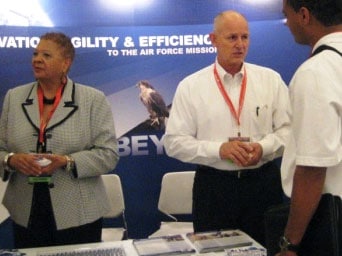 By Jason Hull
By Jason Hull
I have had the pleasure of attending and speaking at the National Veteran Small Business Conference for several years. My company is a Center for Veterans Enterprise (CVE) certified service-disabled veteran-owned small business that is not located particularly close to any major government activity. Over the years, I have used the conference to help evolve and refine my company’s government business strategy. The VA has asked me to blog about my experiences and I’m pleased to share what I hope are valuable insights. Here are a few things I have learned at the conference that have helped me in my business:
The New Business Owner (or How Not To Seem Like the Proverbial Deer in the Headlights)
If this sounds like you or your company, then this conference – I’m going to refer to it as the National Veteran Small Business Conference (NVSBC) from now on – is a great place for you to meet many subject matter experts and understand what it takes to be competitive in the government contract landscape.
However, the NVSBC is NOT a place where you’re going to win government contracts just because you attended. Rarely does this happen. The conference, especially for first time attendees, is the first step in the journey to becoming a successful government contractor.
To maximize the value of attending, there are several things I would suggest you do before you write the check for your conference registration.
Determine and Be Able to Articulate What Makes Your Company Special
“I skate to where the puck is going to be, not where it has been.” – Wayne Gretzky
This step is where most of the new business owners I meet fall short. Telling others that you’re an “Information Technology (IT) services” or an “architecture” company does nothing to tell people what you do. s. It does nothing to distinguish and differentiate your company from the thousands of others that are in your field. Your pitch must be distinctive and pithy. People will make decisions about you – and therefore, by proxy, your company – within the first sentence or two that you say. They are key and critical and you must identify your point of distinction immediately. You are new. You cannot be everything to everybody. Specialize. Narrow. Focus. The more niche your product or service is, the more you can distinguish yourself from others, and the more likely it is that what you do offer will be of value to a potential user of your services.
Ours is in a constant and consistent state of refinement, so it is by no means perfect – please suggest improvements to us! The purpose it does serve is to firstly narrow down what we do and secondly establish our expertise in our field.
OpenSource Connections specializes in the Solr and Lucene open source search engine. OSC Principal Eric Pugh co-authored the book Solr 1.4 Enterprise Search Server, the only published book on Solr.
Build Your Company First
“Get rich slowly.” – J.D. Roth
Sales are the engine that runs any company. Certainly, your company must deliver what it sells, but if it sells nothing, then there are no delivery problems because there’s no work to do. As a fledgling company, this event is a financial investment for the cost of travel and your time to attend.
The large majority of people with whom I have spoken over the years tell a similar tale: “I came from [geographic location far, far away from the conference] and we’re a brand new company and I’m trying to figure out government contracting.” Unless your company offers something specific which only the U.S. government in offices and locations far away from yours needs, you’ve chosen the wrong starting point. In the beginning, your time, effort, and limited capital is much better spent learning how to pursue opportunities in your local market, so you can invest focused time with those potential clients. This conference can help you learn how to identify those opportunities and then perform capture and proposal activities to pursue them.
The second part of your story needs to support your claim of expertise and specialization, and that is done through storytelling. Buyers want to build trust with you and believe that you can deliver quality products or services to them for a fair price. One way that you do that is to tell stories of how the buyer’s situation is similar to one that you have previously experienced and positively solved for someone else.
Research the Market
You’d never set up a meeting with a business who could potentially buy what your company sells without doing some research on them first. Know what they do, what they buy, what they need, and, IF IT IS TRUE, why you’re the best company to meet their needs.
Do the same for the NVSBC. Research the organizations (and take a look at the procurement forecasts for each organization. A simple way to do that is to Google for “[government organization] + OSDBU” (which means “Office of Small and Disadvantaged Business Utilization”). Search for, as an example, “NASA OSDBU”, and then go to the web page and look for the procurement forecast. If it’s not available, give them a call and ask for it.
Once you’ve done your research on each of the organizations you want to target and know what they are buying, it’s easier to come up with a compelling, memorable reason for the Government employees to remember you and your company apart from the thousands of your fellow conference attendees.
Pick a few who match your business profile in terms of both need and geographical proximity and really research them. Even if you drop ship your product or can deliver your services remotely, geographic proximity is still critical because the buyers will not attend NVSBC. You will meet the gatekeepers – some contracting officers and many OSDBUs who can put you in touch with the buyers. It’s easier to market to a geographic area because you can make a credible claim to being able to provide resources they need in a timely and competent manner.
At this point, you’re ready to maximize the value of your first NVSBC
Have a Learning Agenda and Always Be Networking
“Networking is an essential part of building wealth.” – Armstrong Williams
At the conference, there are a ton of sessions and a range of topics. There’s a temptation to try a little bit of everything. For your first conference, keep your learning agenda limited to the following:
- Lay the foundation – something like “Contracting 101” which can give you the basics that you need to understand the general layout of government contracting.
- Find opportunities – get beyond “go look at fbo.gov.” Learn how to set up alerts, look at forecasts, and find out what buyers are looking for.
- Refine opportunities – learn how to use Federal Procurement Data System (FPDS), look at previous awards, discover what the difference between a Request for Proposal (RFP), Request for Quotes (RFQ), Request for
- Information (RFI), and Sources Sought is and how each pertains to you. Learn how and where set-asides and sole source opportunities are possible.
- Respond to opportunities – what are buyers looking for in solicitation responses and how can you make yours stand out.
In addition, talk to every person you can. The people who attend this conference are, generally speaking, either sellers (like you), buyers, or connectors:
“If you can solve a potential customer’s problem number eight, then helping them solve problems one through seven will greatly enhance your chances of being asked to solve number eight.” – Eriks Goodwin
- Sellers – if they’re pure competition, that’s fine. Agree to respond to opportunities in the RFI stage and work to get them set aside. If they’re not, then they might be future partners. Learn who you could and would want to work with.
- Buyers – these are the ones who will potentially cut your company a check to deliver on your promises. Find out what they need and, if there is a fit, how you can stand out compared to everyone else out there.
- Connectors – EVERYONE is a connector whether they choose to act on it or not. If you can’t help someone directly but know someone who can, connect them.
NVSBC is a great conference for learning and meeting lots of people. However, if you don’t prepare adequately and thoroughly, you won’t get nearly as much out of it. Prepare, though, and the conference can be a great launching pad for growing your business.
About the Author: Jason Hull is a principal at OpenSource Connections, and a Solr search engine consultancy. He leads client engagements with marketing functions, helping them to think about the business case behind search. Jason holds a BS from the United States Military Academy at West Point, and an MBA from the University of Virginia’s Darden Graduate School of Business.
ATTENTION READERS
We See The World From All Sides and Want YOU To Be Fully InformedIn fact, intentional disinformation is a disgraceful scourge in media today. So to assuage any possible errant incorrect information posted herein, we strongly encourage you to seek corroboration from other non-VT sources before forming an educated opinion.
About VT - Policies & Disclosures - Comment Policy



